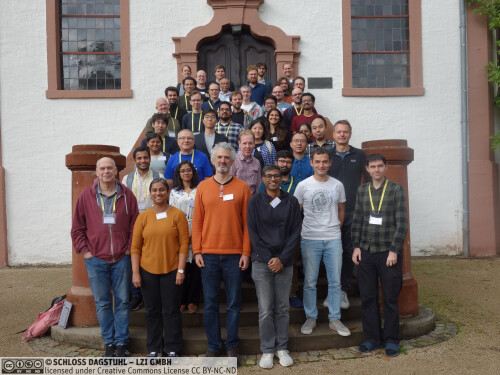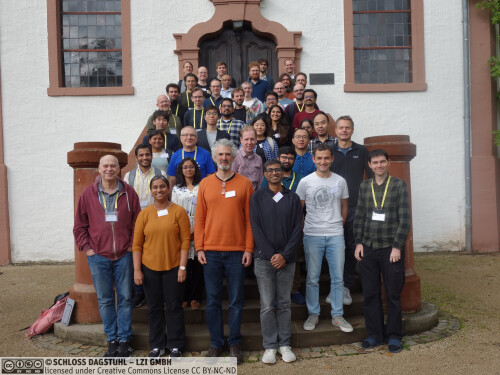Dagstuhl Seminar 24411
New Tools in Parameterized Complexity: Paths, Cuts, and Decomposition
( Oct 06 – Oct 11, 2024 )
Permalink
Organizers
- Fedor V. Fomin (University of Bergen, NO)
- Dániel Marx (CISPA - Saarbrücken, DE)
- Saket Saurabh (The Institute of Mathematical Sciences - Chennai, IN)
- Roohani Sharma (MPI für Informatik - Saarbrücken, DE)
Contact
- Michael Gerke (for scientific matters)
- Christina Schwarz (for administrative matters)
Schedule
Description of the Seminar: Topics and goals
Parameterized Complexity is an alternative approach of handling computational intractability. The main idea of the approach taken by the Parameterized Complexity is to analyze the complexity in finer detail by considering additional problem parameters beyond the input size and expresses the efficiency of the algorithms in terms of these parameters. In this framework, many NP-hard problems have been shown to be (fixed-parameter) tractable (FPT) when certain structural parameters of the inputs are bounded.
In the last three decades, there has been tremendous progress in understanding which problems are fixed-parameter tractable and which problems are not (under standard complexity assumptions). For all these years the central vision of the Parameterized Complexity has been to provide the algorithmic and complexity-theoretic toolkit for studying multivariate algorithmics in different disciplines and subfields of Computer Science. To achieve this vision several algorithmic and complexity theoretic tools such as polynomial time preprocessing, aka, kernelization, color-coding, graph-decompositions, parameterized integer programming, iterative compression, or lower bounds methods based on assumptions stronger than P≠NP have been developed. These tools are universal as they not only helped in the development of the core of Parameterized Complexity but also led to its success in other subfields of Computer Science such as Approximation Algorithms, Computational Social Choice, Computational Geometry, problems solvable in P (polynomial time) to name a few.
In the last few years several decade old open problems in Parameterized Complexity have been resolved. These have resulted in several new algorithmic tools for the core of Parameterized Complexity. These include tools such as iterative and local improvement methods for graph decomposition, methods arising from extremal combinatorics and graph theory, flow augmentation, faster algorithms for solving integer programs on n variables, and new algebraic methods. A natural question is to extend these tools in different directions and explore the limits and applicability of these new tools. Thus,
the main objective of the Dagstuhl Seminar was to initiate the discussion on extension, limits and applicability of newly developed tools arising from paths, cuts, and decomposition.
One of the seminar’s central goals was to facilitate a fruitful dialogue between researchers working at the core of Parameterized Complexity and those from Mathematical Programming, Computational Linear Algebra, Graph Theory, and Combinatorics, who had contributed to recent advances in parameterized algorithms. The Dagstuhl event enabled participants to explore possibilities for developing new tools and techniques that emerged from this collaboration.
Next, the seminar presented a few concrete examples of newly developed tools and techniques from various domains of Parameterized Complexity, which formed the focal points of discussion.
Width Parameters: Treewidth and Twinwidth.
Tools Based on Extremal Combinatorics: Paths and Rainbow Matching.
Cut Based Tool: Flow Augmentation.
Mathematical Programming.
Algebraic Methods.
Related Seminars
During the five-day seminar, 48 researchers from theoretical computer science, mathematical optimization, and operations research convened. Attendees ranged from senior scientists to postdoctoral scholars and advanced doctoral candidates, creating a rich environment for both mentorship and innovation.
The seminar featured 22 presentations of varying lengths. Six keynote speakers–Dániel Marx, Michał Pilipczuk, Euiwoong Lee, Tuukka Korhonen, Jie Xue, and Daniel Lokshtanov–delivered 60-minute talks that provided overviews of state-of-the-art methods and showcased recent breakthroughs in their respective areas. The remaining slots were filled with shorter, 30-minute talks covering various topics.
At the beginning of the week, open problem sessions encouraged participants to share challenges and spark collaborative research. The schedule also included ample free time, which attendees used for productive discussions and joint work, fostering new ideas and potential research partnerships.
Outcomes
Organizers and participants regarded the seminar as a great success. It successfully brought together the relevant research communities, facilitated the sharing of state-of-the-art results, and enabled discussions on the major challenges in the field. The talks were not only excellent but also highly stimulating, prompting active engagement in working groups during afternoons and evenings. Particularly noteworthy was the participation of younger researchers (postdocs and PhD students), who integrated seamlessly and contributed to the seminar’s collegial and productive atmosphere.
 Fedor V. Fomin, Dániel Marx, Saket Saurabh, and Roohani Sharma
Fedor V. Fomin, Dániel Marx, Saket Saurabh, and Roohani Sharma
This Dagstuhl Seminar will concentrate on developing new tools arising from the parameterized complexity of cuts, paths, and graph decompositions. The last 2 years have been very exciting for the area, with several breakthroughs.
In FOCS 2021, Korhonen introduced a new method for approximating tree decompositions in graphs. His method, deeply rooted in the classical graph theory, is a handy tool for decomposing graphs. Several recent STOC/FOCS papers are developing this method in various settings. In parallel, a novel perspective on graph decompositions was proposed by Bonnet et al. in FOCS 2020. The new twin-width theory has many exciting consequences, and we are still beginning to understand the real impact of the new decompositions on graph algorithms.
In the series of papers (SODA 2021, STOC 2022, SODA 2023), Kim et al. developed a beautiful algorithmic method for handling separators in (undirected, weighted, or directed) graphs by addition of arcs. The new algorithmic tool was used to resolve several long-standing open problems in the area. It also paves the road to many more new discoveries.
Reis and Rothvoss (Arxiv 2023) announced a (log n)O(n) time randomized algorithm to solve integer programs in n variables. This breakthrough will have an impact on many problems in parameterized complexity, especially on the problems of cuts in graphs. Finally, using algebraic methods (new and old), there has been significant progress on several problems around paths, including the classical k-disjoint path problems.
This seminar aims to bring together people from the parameterized complexity community, specialists from the world of cuts, flows, and connectivity, and those who have been at the forefront of these new developments. Thus, this seminar aims to bring together experts from these fields, consolidate the results achieved in recent years, discuss future research directions, and explore further the potential applications of the methods and techniques discussed above.
 Fedor V. Fomin, Dániel Marx, Saket Saurabh, and Roohani Sharma
Fedor V. Fomin, Dániel Marx, Saket Saurabh, and Roohani Sharma
- Akanksha Agrawal (Indian Institute of Techology Madras, IN) [dblp]
- Aditya Anand (University of Michigan - Ann Arbor, US)
- Matthias Bentert (University of Bergen, NO) [dblp]
- Édouard Bonnet (ENS - Lyon, FR) [dblp]
- Joseph Cheriyan (University of Waterloo, CA) [dblp]
- Éric Colin de Verdière (Gustave Eiffel University - Marne-la-Vallée, FR) [dblp]
- Eduard Eiben (Royal Holloway, University of London, GB) [dblp]
- Fedor V. Fomin (University of Bergen, NO) [dblp]
- Robert Ganian (TU Wien, AT) [dblp]
- Petr A. Golovach (University of Bergen, NO) [dblp]
- Bart Jansen (TU Eindhoven, NL) [dblp]
- Eun Jung Kim (KAIST - Daejeon, KR & CNRS - Paris, FR) [dblp]
- Yusuke Kobayashi (Kyoto University, JP) [dblp]
- Christian Komusiewicz (Friedrich-Schiller-Universität Jena, DE) [dblp]
- Tuukka Korhonen (University of Copenhagen, DK) [dblp]
- Stefan Kratsch (HU Berlin, DE) [dblp]
- Madhumita Kundu (University of Bergen, NO) [dblp]
- Euiwoong Lee (University of Michigan - Ann Arbor, US) [dblp]
- Bingkai Lin (Nanjing University, CN) [dblp]
- William Lochet (CNRS - Montpellier, FR) [dblp]
- Daniel Lokshtanov (University of California - Santa Barbara, US) [dblp]
- Dániel Marx (CISPA - Saarbrücken, DE) [dblp]
- Neeldhara Misra (Indian Institute of Techology - Madras, IN) [dblp]
- Pranabendu Misra (Chennai Mathematical Institute, IN) [dblp]
- Jesper Nederlof (Utrecht University, NL) [dblp]
- Daniel Neuen (MPI für Informatik - Saarbrücken, DE) [dblp]
- Fahad Panolan (University of Leeds, GB) [dblp]
- Marcin Pilipczuk (University of Warsaw, PL) [dblp]
- Michal Pilipczuk (University of Warsaw, PL) [dblp]
- Thatchaphol Saranurak (University of Michigan - Ann Arbor, US) [dblp]
- Ignasi Sau Valls (LIRMM, Université de Montpellier, CNRS - Montpellier, FR) [dblp]
- Saket Saurabh (The Institute of Mathematical Sciences - Chennai, IN) [dblp]
- Roohani Sharma (MPI für Informatik - Saarbrücken, DE) [dblp]
- Ramanujan Sridharan (University of Warwick - Coventry, GB) [dblp]
- Giannos Stamoulis (University of Warsaw, PL) [dblp]
- Vaishali Surianarayanan (University of California - Santa Barbara, US)
- Stefan Szeider (TU Wien, AT) [dblp]
- Erik Jan van Leeuwen (Utrecht University, NL) [dblp]
- Magnus Wahlström (Royal Holloway, University of London, GB) [dblp]
- Michal Wlodarczyk (University of Warsaw, PL) [dblp]
- Jie Xue (New York University - Shanghai, CN) [dblp]
Related Seminars
Classification
- Computational Complexity
- Data Structures and Algorithms
Keywords
- Parameterized Complexity
- fixed-parameter tractability
- intractability



 Creative Commons BY 4.0
Creative Commons BY 4.0
